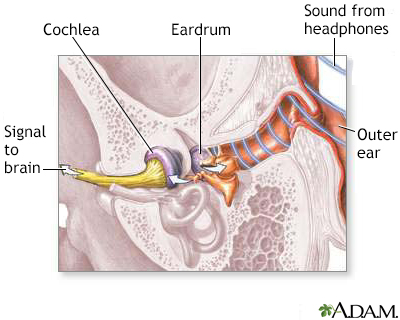Acoustic trauma
Injury - inner ear; Trauma - inner ear; Ear injury
Acoustic trauma is injury to the hearing mechanisms in the inner ear. It is due to very loud noise.
Images

I Would Like to Learn About:
Causes
Acoustic trauma is a common cause of sensory hearing loss. Damage to the hearing mechanisms within the inner ear may be caused by:
- Explosion near the ear
- Firing a gun near the ear
- Long-term exposure to loud noises (such as loud music or machinery)
- Any very loud noise near the ear
Symptoms
Symptoms include:
- Partial hearing loss that most often involves repeated long-term exposures to loud or high-pitched sounds. The hearing loss may slowly get worse.
- Noises, ringing in the ear (tinnitus).
Exams and Tests
The health care provider will most often suspect acoustic trauma if hearing loss occurs after noise exposure. A physical exam will determine if the eardrum is damaged. Audiometry may determine how much hearing has been lost.
Treatment
The hearing loss may not be treatable. The goal of treatment is to protect the ear from further damage. Eardrum repair may be needed.
A hearing aid may help you communicate. You can also learn coping skills, such as lip reading.
In some cases, your provider may prescribe steroid medicine to help bring back some of the hearing.
Outlook (Prognosis)
Hearing loss may be permanent in the affected ear. Wearing ear protection when around sources of loud sounds may prevent the hearing loss from getting worse.
Possible Complications
Progressive hearing loss is the main complication of acoustic trauma.
Tinnitus (ear ringing) can also occur.
When to Contact a Medical Professional
Contact your provider if:
- You have symptoms of acoustic trauma
- Hearing loss occurs or gets worse
Prevention
Take the following steps to help prevent hearing loss:
- Wear protective ear plugs or earmuffs to prevent hearing damage from loud equipment.
- Be aware of risks to your hearing from activities such as shooting guns, using chain saws, or driving motorcycles and snowmobiles.
- DO NOT listen to loud music for long periods of time.
Related Information
Hearing lossReferences
Arts HA, Adams ME. Sensorineural hearing loss in adults. In: Flint PW, Francis HW, Haughey BH, et al, eds. Cummings Otolaryngology: Head and Neck Surgery. 7th ed. Philadelphia, PA: Elsevier; 2021:chap 152.
Crock C, de Alwis N. Ear, nose and throat emergencies. In: Cameron P, Little M, Mitra B, Deasy C, eds. Textbook of Adult Emergency Medicine. 5th ed. Philadelphia, PA: Elsevier; 2020:chap 18.1.
Le Prell CG. Noise-induced hearing loss. In: Flint PW, Francis HW, Haughey BH, et al, eds. Cummings Otolaryngology: Head and Neck Surgery. 7th ed. Philadelphia, PA: Elsevier; 2021:chap 154.
BACK TO TOPReview Date: 5/2/2024
Reviewed By: Josef Shargorodsky, MD, MPH, Johns Hopkins University School of Medicine, Baltimore, MD. Also reviewed by David C. Dugdale, MD, Medical Director, Brenda Conaway, Editorial Director, and the A.D.A.M. Editorial team.

Health Content Provider
06/01/2025
|
A.D.A.M., Inc. is accredited by URAC, for Health Content Provider (www.urac.org). URAC's accreditation program is an independent audit to verify that A.D.A.M. follows rigorous standards of quality and accountability. A.D.A.M. is among the first to achieve this important distinction for online health information and services. Learn more about A.D.A.M.'s editorial policy, editorial process and privacy policy. A.D.A.M. is also a founding member of Hi-Ethics. This site complied with the HONcode standard for trustworthy health information from 1995 to 2022, after which HON (Health On the Net, a not-for-profit organization that promoted transparent and reliable health information online) was discontinued. |
The information provided herein should not be used during any medical emergency or for the diagnosis or treatment of any medical condition. A licensed medical professional should be consulted for diagnosis and treatment of any and all medical conditions. Links to other sites are provided for information only -- they do not constitute endorsements of those other sites. © 1997- 2025 A.D.A.M., a business unit of Ebix, Inc. Any duplication or distribution of the information contained herein is strictly prohibited.
